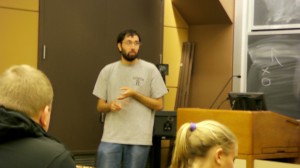For the second year in a row, Boston University’s Palestine Film Festival is underway. Hosted by BU’s Students for Justice in Palestine (SJP) group, the festival showcased a different film every night, each showing various aspects of the ongoing conflict between Palestinians and Israelis.
The first film of the night, Jerusalem: The East Side Story, traces the story of Jerusalem from its beginnings in 1882 to Israel today, as the government tries to “Judize” the city through the expulsion of Palestinians into walled cantons. Day two’s film followed a similar vein. In To Shoot an Elephant, foreigners who were under the guise of being embedded inside the Gaza Strip ambulances contributed a series of eyewitness accounts about what is going on in the area.

The next night saw a change in the direction of the films. The two short films 25,000 Tents, Maybe more and Thyme Seller showed a slice of life of the everyday Palestinian. The former captures the lives of Palestinians currently stranded in al-Tanaf detention camp in a no man’s land on the Iraq-Syria border, while the latter concerns a Palestinian woman who plants and collects thyme so that she can sell it for a living.
“We tried to balance intensities so people don’t feel emotionally washed out,” said Ian Chinch, a member of SJP and a second year doctoral candidate at BU, when asked about the choice of films this year. “We also wanted something on the daily life of a Palestinian, and it really shows images of Palestine that are very reminiscent if you’ve never been there before.”
The final day was wrapped up with an emotional film called Jenin, Jenin, a documentary about residents of Jenin, and how they are coping after the destruction of their city due to the Israeli army’s Defensive Wall operation.
On why the SJP wanted to bring the Palestine Film Festival to BU, Katherine Knight, College of Arts and Sciences ’11 and a member of SJP, said that “All of the films have featured Palestinians talking about their lives and their situation, and that’s really important for Americans in order to understand the full scope of the effects that the Occupation is having. A lot of the people who came to our first showing and weren’t sure about the situation or what it was all about came back every night and that means its working to get education and awareness out.”
All of the films were powerful and harrowing, effectively showing the sense of displacement that was evident in the lives of many Palestinians. The narrator of 25,000 Tents, Maybe More says in a solemn voice-over “Whoever is born to a non-existent country, does not exist at all,” a statement very much reflected in the lives of the people in all five films.
Perhaps the most poignant film of the whole week is Thyme Seller. Watching this elderly woman (and the filmmaker’s mother) pick the thyme, then struggle to sell it and ultimately be rejected by each door she knocks on, strikes a chord in the viewer and really brings to light the hardships of everyday life for Palestinians.
“Each film talked about a different factor [of the conflict]. It’s humanitarian, economic and social as well. Promoting issues through movies is such a fantastic thing,” says College of General Studies ‘13, Kareem Chehayeb. “It’s important for people in the United States who aren’t near the region to come to these things, to see these movies, and to learn more about what’s going on there.”
For more information about SJP, click here

wow thats really really biased.
A bias towards justice is no fault.